Phenotyping and the future of Forensic Genetic Genealogy
Template not found:
Template not found:
Are you worried about access to your online tree if you let your Ancestry.com subscription lapse? The tree should still be there. But take these steps to be sure your Ancestry family tree remains accessible and secure–along with the records you’ve attached to it.
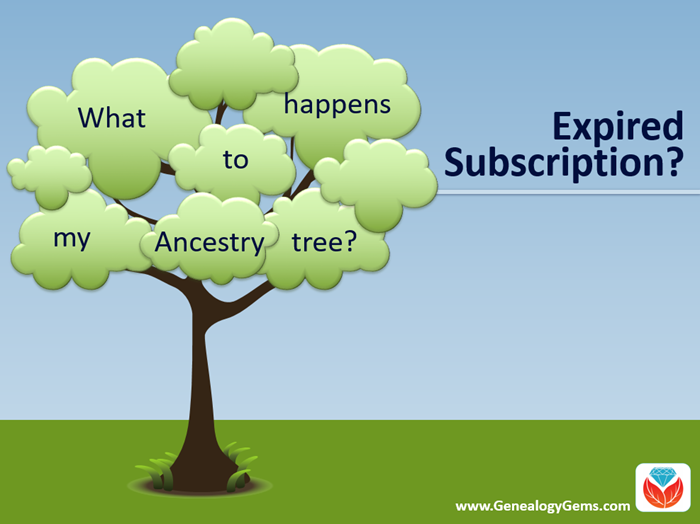
Many people start researching their genealogy with an Ancestry subscription. They build their family tree on the web site, adding details about their relatives.
Then they sift through Ancestry’s billions of historical records and add hundreds or even thousands of new names, dates, relationships and other facts to their family trees. Along the way, they attach records to each ancestor as evidence of what they’ve learned.
All of this adds up to a unique family tree that is precious to your family.
However, it is very common for the busyness of life to call them away from their genealogy research for a while. This is what happened to Genealogy Gems reader Beverly. She wrote to me, concerned about what will happen to all her hard work on that Ancestry tree:
“I have been a member of Ancestry.com for a long time and have worked on several trees. I love to work on my genealogy but lately have not had time. Can I drop my membership and still retain my trees? I plan to get my membership back at a later day. Right now I am wasting $20 a month.”
Beverly, I hear your pain!
We all go through busy seasons. It’s easy to cringe at the thought of paying for genealogy website subscriptions we aren’t currently using.
But the idea of losing all our progress on those web sites if we let our subscription lapse is worse. Your Ancestry subscription has not only included your online family tree, but also all of the records that you found and attached to that tree.
I did a little research along with Sunny Morton, Genealogy Gems Editor and our resident expert on the “Genealogy Giants” websites” (Ancestry, FamilySearch, Findmypast and MyHeritage). Here’s what we can tell Beverly and everyone else who is wondering what will happen to their family tree and all that research if their Ancestry account expires:
According to Ancestry, the answer is yes, you can still access your trees with your login credentials after your subscription lapses. The most important thing is that you don’t delete the tree or the account altogether.
Ancestry continues to host people’s trees because they want our tree data to share with others, and to give people a reason to come back!
But be aware that if you do not renew your Ancestry subscription, your account will revert to a free guest account. (Your user name and password will remain the same.) This means that you will not be able to access most of Ancestry’s historical records, including the ones you’ve already attached to your trees. And I say “trees” because many people have multiple family trees on Ancestry to be concerned about.
To see the historical genealogy records that you have attached to an ancestor in your online tree, click on a person in your family tree, and then click Profile:
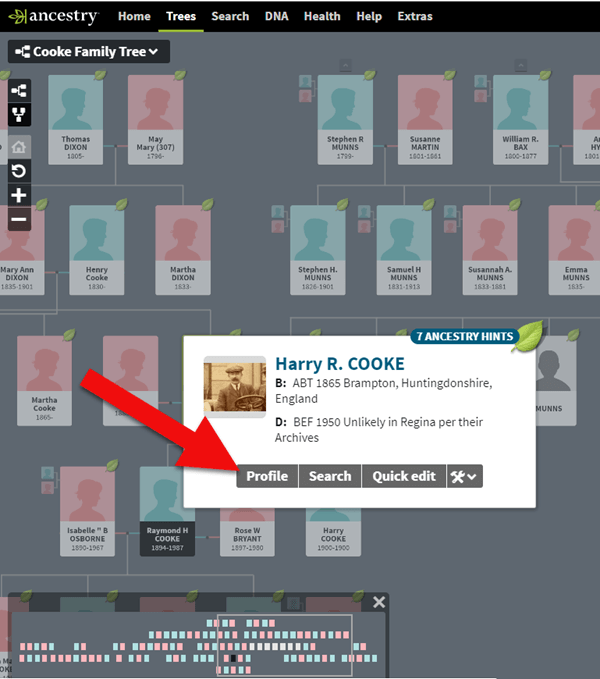
How to find genealogy records attached to a person in your Ancestry tree.
You will be taken to their profile page where you will see the genealogical sources you have attached.
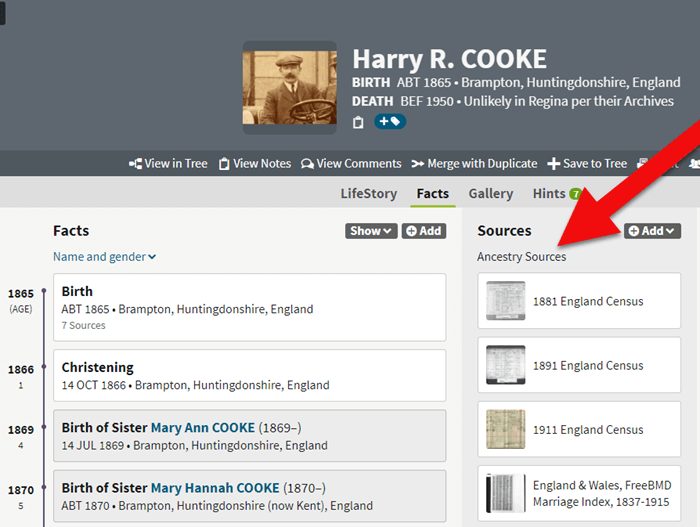
If your Ancestry account expires you can’t access records attached to your tree.
These are records that you will not be able to access when your subscription expires.
If you plan to let your Ancestry.com subscription lapse for a while, but you want to continue to work with your online trees, consider taking these steps:
The first thing to do is download a copy of every record that you’ve attached to your ancestors’ individual files on Ancestry.com.
You can do this by opening the image of the record, clicking on the Save/Saved button at the upper right, and clicking Save to your computer. I suggest doing this even if you don’t foresee letting your subscription go in the near future.
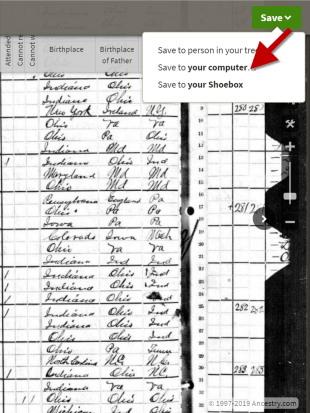
Saving a document to your computer from Ancestry before your subscription expires
I recommend using a consistent system to organize these, which I explain in the free Family History: Genealogy Made Easy podcast, in episodes 32-33. (Genealogy Gems Premium website members have access to a 2-part video tutorial on organizing their hard drives.)
If you don’t have a consistent way to organize these document images, you’ll soon become overwhelmed with files that all sort of look the same and you won’t be sure what year they are or which ancestors they pertain to without opening each one!
You may be wondering “What about cloud storage options, such as Google Drive or Dropbox?” These type of cloud storage solutions are ok too. However, I recommend using these platforms more as temporary or backup storage or to share with relatives, rather than as your primary storage.
A better alternative would be to invest in cloud-based backup for your home computer. I use Backblaze personally and for my business.
Click here for instructions; it’s really easy.
Yes, Ancestry does continue to maintain your trees, but what guarantees do you have?
Data loss does happen even on big websites, and sites change their practices and policies sometimes. If that happens, you could lose all the information you’ve carefully added to your tree.
Don’t just keep your family tree online where you don’t have complete control.
A “master family tree” is your most complete, up-to-date version of your tree (or trees, if you build separate ones for separate family lines).

Keeping your master tree on your own computer keeps all your tree data at your fingertips without any subscription required. Having one master file matters even more once you start sharing your tree on other websites or with relatives.
I use RootsMagic, and that is why I happily agreed to them sponsoring my Genealogy Gems Podcast. It works for Mac and the PC.
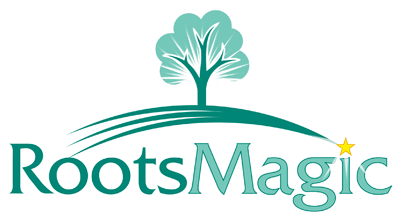
I like its affordability: there’s a free version you can try for as long as you like, and the full software will cost you the same as about 90 days of access to Ancestry.com.
RootsMagic also has solid relationships with the major genealogy sites: it now syncs with your trees on Ancestry.com and FamilySearch.org, and you can research records on MyHeritage.com and Findmypast.com.
RootsMagic has tons of advanced features to help you create family history charts, books, and reports, and a great user support community online.
Keep up with news and changes on the “genealogy giants” websites with our ongoing coverage of Ancestry.com, FamilySearch.org, Findmypast.com, and MyHeritage.com here.
Disclosure: this post recommends carefully-chosen products and services for which we receive compensation. Click here to read my full disclosure statement, and thank you for supporting the free content we provide at Genealogy Gems.
The key to learning about our ancestors from our own DNA is to have a lot of people tested who can all trace their ancestry to a specific geographic location. A groundbreaking scientific study has just been published in Nature by Stephen Leslie and colleagues that details the origins of the people of the UK. (Read the abstract here.) This study has ramifications for you, as a genetic genealogist, even if you don’t have origins in the UK.
Dr. Leslie and colleagues collected data from 2,039 Britons of European ancestry who lived in rural areas and knew that their four grandparents were all born within 80 kilometers (50 miles) of each other. This means that their DNA should accurately represent the DNA of individuals living in that area in the late 1800s. Using multiple fancy and advanced statistical methods, the researchers identified 17 distinct genetic groups. When they overlaid these groups on a map of the UK, what they found was remarkable. Each genetic group, with few exceptions, mapped to a very specific geographic location.
The largest cluster by far, encompassing half of those tested, maps to Central/South England. Well, the first serious settlers of Britain were from the Roman Empire whose influence in 43 AD at the time of their entry into Britain was extensive, from Spain to France to Italy to parts of the middle east and North Africa. Then around 450 AD the Angles, from modern day northern Germany and southern Denmark, and the Saxons, from Germany, invaded. According to linguistic and archeological evidence, the previous Roman culture was basically wiped out. But were the actual people destroyed, or just their culture?
To find out, the team compared the UK samples with 6,209 people from continental Europe to understand their ancestors’ contributions to Britons’ ancestry. According to the DNA evidence, the descendants of those first Roman settlers are still very much alive. In fact, the paper reports that Saxon ancestry in Central/South England is very likely to be under 50%, and most likely in the range of 10–40%, with instead a large portion of the genetics now being attributed to France and by extension, the Roman Empire.
Another interesting finding: the Viking conquerors were nearly genetically absent in most of the UK.
Very unfortunately, this data on DNA in the UK will not be a part of the reference samples at your genetic genealogy testing company. But it does demonstrate unequivocally that THIS WORKS! DNA testing can help us trace our ancestral origins and thanks to improved techniques and larger data sets, we have much to look forward to. Dr. Peter Donnelly, population geneticist at Oxford and co-author of this paper said, “History is written by the winners, and archaeology studies the burials of wealthy people. But genetic evidence is interesting because it complements that by showing what is happening to the masses rather than the elite.”
Learn more about DNA testing for family history with my Getting Started in Genetic Genealogy Quick Guide, available now in the Genealogy Gems store. In fact, I have a whole series of Guides there on using DNA for genealogy. Check them all out!
If you’re ready for some one-on-one consulting to see what DNA can tell you about your family history, visit my website to learn more.
Michael Ibsen, a cabinet maker living in London, was recently awarded the title of “royal descendant” when researchers identified him as a direct maternal descendant of Ann of York. Why did this lucky man have an unsolicited team of researchers filling in 17 generations of his genealogy?
They were trying to identify a body.
A body discovered under a parking lot in Leichester, England.
According to an article in the Mail Online, thanks to the mitochondrial DNA (mtDNA) of Ibsen, that body has been identified as Richard the III. Researchers needed Ibsen because his mtDNA is EXACTLY the same as his 17th great grandmother, Ann of York. Because mothers pass their mtDNA to all of their children, and only the daughters pass it on to the next generation, Ann had exactly the same mtDNA as her brother, Richard.
With the positive identification in hand, researchers are now prepared to undertake a £100,000 project to discover the combination of letters in a four-digit code that makes up the genetic book that is (or was) Richard III. This process is called full genome sequencing. They are also planning to sequence Mr. Ibsen’s genome to see what shared segments may still remain.
What does this project have to do with you?
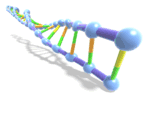 So what does this project have to do with you the genealogist who doesn’t have a team of researchers hammering out your 17th generation grandparents?
So what does this project have to do with you the genealogist who doesn’t have a team of researchers hammering out your 17th generation grandparents?
First, it is a win for genetic genealogy as mtDNA was used to unequivocally link past and future generations. Each story like this serves to increase buy soma medication online awareness for genetic genealogy, which means more people get tested, which means databases grow larger, which means you will find more matches, which means you will have more genealogical success. Plus, the comparison of the ancient Richard the III genome with the modern genome of Mr. Ibsen will be the first of its kind to try to identify shared segments of DNA after so many generations.
In a recent interview Michael Ibsen said, “I almost hope somewhere along the line they dig up some more people so others can be ancestors and descendants in the same sort of way. It is going to be an extraordinary experience.”
Someone needs to introduce Mr. Ibsen to genetic genealogy as that is EXACTLY what genetic genealogy is all about-but minus the digging up the bones part! Genetic genealogy is all about using the DNA of living people to reconstruct the DNA of your ancestors. It is about making connections among modern day genealogists that can help them answer questions about their relatives.
While a full genome sequence is not a practical genealogical tool for most genealogists, there are other kids of DNA tests that could help you answer genealogical questions.
You can find more information about a few famous people and their DNA here.
And learn even more by reading MNT’s article 3D model provides new insight into King Richard III’s spinal condition.
And don’t miss Lisa’s interview with Dr. Turi King who ran the DNA testing on King Richard III. Listen to Genealogy Gems Podcast episode 152 now.